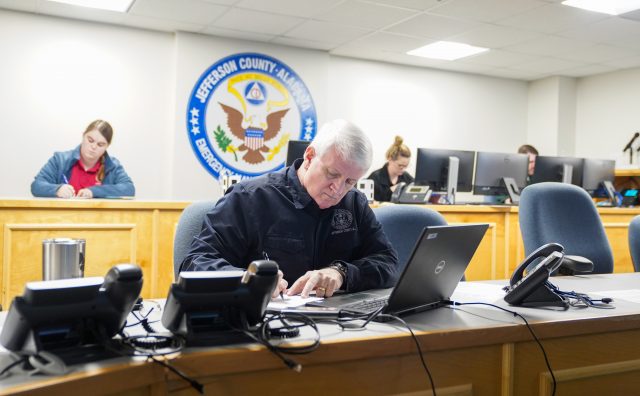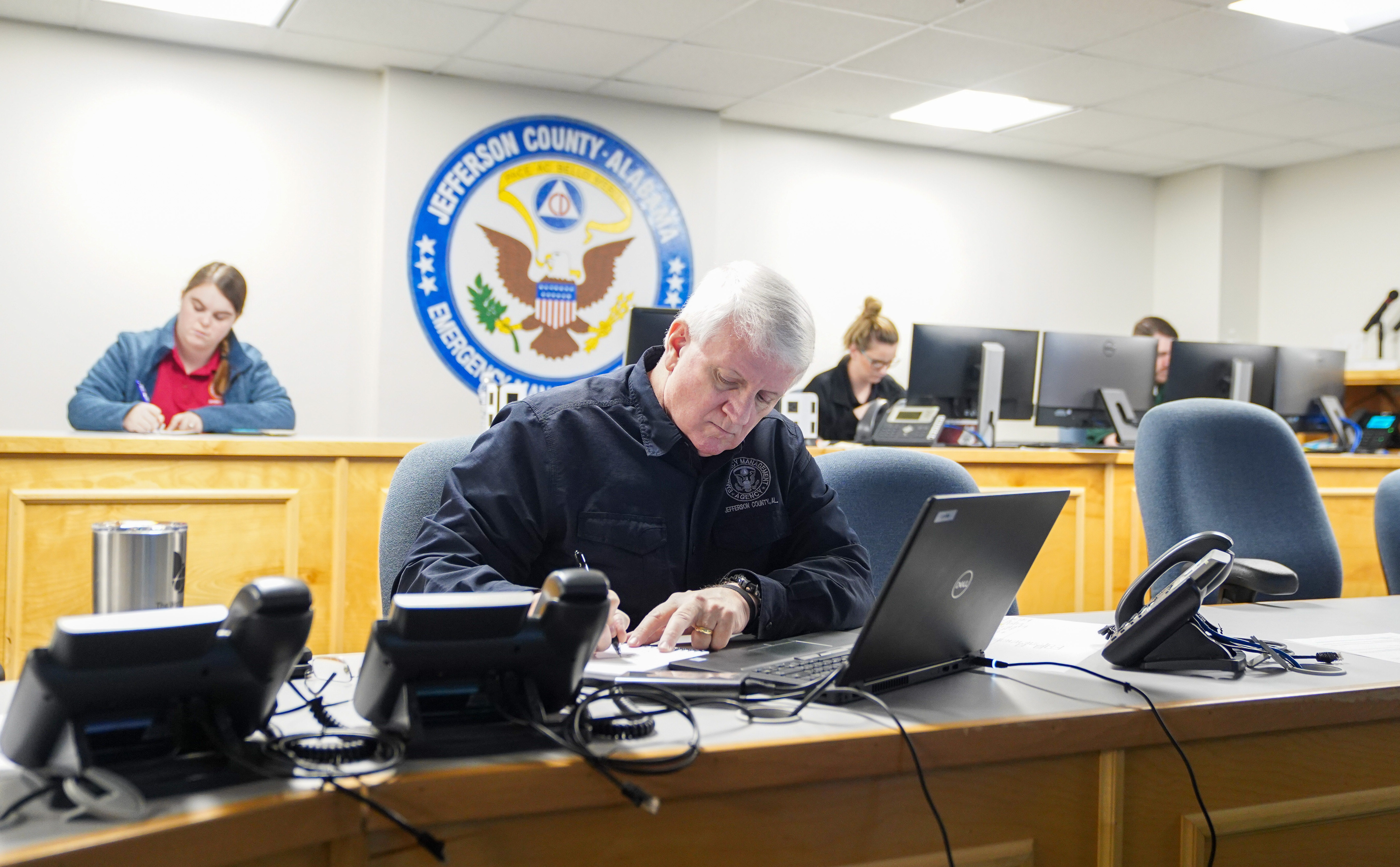
By Barnett Wright
The Birmingham Times
A bank of TV flat-screens displaying colorful maps and statistical data flicker high on the wall inside the command center of the Jefferson County Emergency Management Agency. Normally, officials gather in this space to monitor dangerous storms that threaten havoc across the Birmingham area.
On this morning, however, the atmosphere in the center is different as administrators assemble to deal with a menace much more deadly than severe weather — the COVID-19 pandemic.
Welcome to the Jefferson County Unified Command Center in downtown Birmingham. Set up two months ago, this where some of the area’s top specialists gather to strategize about combatting the spread of the disease.
“Unlike a tornado, which you can see — you know where the damage path is, and you know who is involved — [COVID-19] is something you don’t see,” said Jim Coker, Jefferson County EMA director. “You don’t know where it is, and maybe for two weeks, you don’t know who is involved. It’s unlike anything we’ve ever faced.”
Coker and Jefferson County Health Officer Mark Wilson, M.D., serve as co-leaders of the Unified Command Center, which involves individuals from the Jefferson County Department of Health, city and county government departments, medical facilities, response agencies, correctional facilities, places of worship, homelessness advocates, and volunteer groups.
Representatives, or liaisons, from each of those agencies communicate several times a week to address the current health crisis that has posed challenges worldwide.
Making the matter more daunting are the social distancing protocols that prevent local officials from meeting in person, so the entire response effort is being handled virtually — a first for all involved.
“We are using technology to accomplish what would normally be done in person,” Coker said. “These are the many Zoom calls, conference calls, dashboards.”
Twice a week, there is a “command call,” during which Coker, Wilson, and section chiefs (officials who oversee areas, such as operations, planning, logistics, health care, and public information) and their liaisons provide updates on the fight to reduce the spread of the COVID-19 virus. The rest of the week, planning section team members “talk about COVID-19 from the time they wake up until the time they go to bed,” Coker said.
While individuals from several different agencies and groups work together, no elected officials are a part of this team.
“They’ve got jurisdictions to run,” Coker said. “They’ve got cities to run. You don’t see county commissioners here [for the] same reason: They have a county to run. You do not see police chiefs or fire chiefs, [though] some of their subordinate staff are here.
“In spite of COVID-19, everything that goes on normally during a day [in a city or county] is still going on.”
Weekly Meeting
The weekly meetings, which last about an hour and are attended by all of the section chiefs and liaisons, are run by Allan Rice, Hoover City Administrator or Matt Russell, Executive Director, Alabama Fire College. Rice, past head of the Alabama Fire College is a former firefighter/paramedic who has an undergraduate degree in nursing from UAB and has experience dealing with matters on the municipal and medical fronts. Russell is a former Birmingham firefighter.
Others who participate in the calls include Sarah Nafziger, M.D., a professor in the UAB Department of Emergency Medicine and co-chair of the university’s Emergency Management Committee; Andra Sparks, presiding judge for the city of Birmingham Municipal Court and a former military attorney in the U.S. Army who attained the rank of captain and Tara Harmon, a registered dietitian and nutritionist with expertise in hunger and food insecurity.
Feeding
Since the health crisis hit, nearly 450,000 people in Alabama have applied for unemployment. With the increased number of people out of work, many families are in need of food.
The Unified Command Center realized this was a concern early on and has worked to address the issue. This month, the Central Alabama Food Bank and the Christian Service Mission reported feeding 69,309 families, which amounted to 215,051 pounds of food. Officials also noted that several groups are helping with meal delivery, including Kikstart Inc., a program that aims to provide healthy, nutritious food, serving mostly children, as well as area churches, such as the Church of the Highlands McCalla campus.
In addition, people are working with different feeding groups across the county, including “seniors and homebound people, [those with] special dietary needs, and schoolchildren that are eligible for free and reduced lunches,” Coker said.
Health Orders
Another crucial part of the Unified Command Center’s efforts involve health orders, such as those issued by the state of Alabama, city of Birmingham, and JCDH, as well as Gov. Kay Ivey’s statewide “Safer at Home Order” that took effect on May 11.
“Our Unified Command Center will continue efforts to promote the safety of our community as we enter this new phase of ‘Safer at Home,’” Wilson said.
Last week, Alabama’s governor announced the end of some restrictions on gyms, restaurants and gatherings. Wilson was among several public health experts in Birmingham who warned that coronavirus cases haven’t receded in the state and could spike if people don’t continue precautions.
On Tuesday, the Birmingham City Council extended its mandatory face covering ordinance to May 22.
Wilson added that he would strongly recommend that people avoid large groups for at least two more weeks.
“It’s not an order — it’s a recommendation. Just because you’re allowed to do something doesn’t mean it’s the smart thing or the right thing to do,” Wilson said, adding that the number of coronavirus cases haven’t been decreasing in Alabama.
Some counties, in fact, have seen large increases in recent weeks.
“I am very, very concerned about the fact that we do not have decreasing incidence of the disease in the community,” Wilson said. “COVID-19 is still with us. It’s still with us quite steadily.”
Meanwhile, Unified Command Center leaders said its members “will continue to operate until the need ceases to exist.”
Know How it Spreads
- There is currently no vaccine to prevent coronavirus disease 2019 (COVID-19).
- The best way to prevent illness is to avoid being exposed to this virus.
- The virus is thought to spread mainly from person-to-person.
Between people who are in close contact with one another (within about 6 feet).
Through respiratory droplets produced when an infected person coughs or sneezes.
- These droplets can land in the mouths or noses of people who are nearby or possibly be inhaled into the lungs.
Take steps to protect yourself
Clean your hands often
- Wash your hands often with soap and water for at least 20 seconds especially after you have been in a public place, or after blowing your nose, coughing, or sneezing.
- If soap and water are not readily available, use a hand sanitizer that contains at least 60% alcohol. Cover all surfaces of your hands and rub them together until they feel dry.
- Avoid touching your eyes, nose, and mouth with unwashed hands.
Avoid close contact
- Avoid close contact with people who are sick
- Put distance between yourself and other people if COVID-19 is spreading in your community. This is especially important for people who are at higher risk of getting very sick.
Take steps to protect others
Stay home if you’re sick
- Stay home if you are sick, except to get medical care. Learn what to do if you are sick.
Cover coughs and sneezes
- Cover your mouth and nose with a tissue when you cough or sneeze or use the inside of your elbow.
- Throw used tissues in the trash.
- Immediately wash your hands with soap and water for at least 20 seconds. If soap and water are not readily available, clean your hands with a hand sanitizer that contains at least 60% alcohol.
Wear a facemask if you are sick
- If you are sick: You should wear a facemask when you are around other people (e.g., sharing a room or vehicle) and before you enter a healthcare provider’s office. If you are not able to wear a facemask (for example, because it causes trouble breathing), then you should do your best to cover your coughs and sneezes, and people who are caring for you should wear a facemask if they enter your room. Learn what to do if you are sick.
- If you are NOT sick: You do not need to wear a facemask unless you are caring for someone who is sick (and they are not able to wear a facemask). Facemasks may be in short supply and they should be saved for caregivers.
Clean and disinfect
- Clean AND disinfect frequently touched surfaces daily. This includes tables, doorknobs, light switches, countertops, handles, desks, phones, keyboards, toilets, faucets, and sinks.
- If surfaces are dirty, clean them: Use detergent or soap and water prior to disinfection.
To disinfect:
Most common EPA-registered household disinfectants will work. Use disinfectants appropriate for the surface.
Options include:
- Diluting your household bleach.
To make a bleach solution, mix:
5 tablespoons (1/3rd cup) bleach per gallon of water
OR
4 teaspoons bleach per quart of water
Follow manufacturer’s instructions for application and proper ventilation. Check to ensure the product is not past its expiration date. Never mix household bleach with ammonia or any other cleanser. Unexpired household bleach will be effective against coronaviruses when properly diluted.
- Alcohol solutions.
Ensure solution has at least 70% alcohol. - Other common EPA-registered household disinfectants.
Products with EPA-approved emerging viral pathogens pdf icon[7 pages]external icon claims are expected to be effective against COVID-19 based on data for harder to kill viruses. Follow the manufacturer’s instructions for all cleaning and disinfection products (e.g., concentration, application method and contact time, etc.).
In Need of Food
If anyone in the County is in need of food/meals please call the United Way 2-1-1 line. The United Way needs your contact information and your zip code. Based on your location they will connect you to the appropriate agency to help fill your needs. The United Way also has a line for senior citizens 1-800-AGE-LINE (800-243-5463).
Seniors or their family members can call and get them set up for Meals on Wheels where applicable.
Volunteering:
- If anyone within Jefferson County has the desire to donate their time to volunteer, the Command Center has centralized opportunities. Anyone interested should visit https://olc.alabamafirecollege.org/ to register, take a brief online training, and select your area of interest. Once completed save your form and a member of the Command team will be in touch. Please do not volunteer if you have health issues such as asthma, diabetes, heart or lung issues. Jefferson County Unified Command Information Center:
REMEMBER: COVID-19 can be spread by people who have no symptoms, so everyone should act as if they or others around them may be infected.













